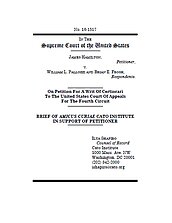Learn more about Cato’s Amicus Briefs Program.
The landmark Supreme Court case District of Columbia v. Heller established that the right to keep and bear arms under the Second Amendment is an individual right. McDonald v. City of Chicago, which applied the right against state laws,clarified that states can’t “single out” the Second Amendment and treat it with less respect than any other fundamental right. Heller and McDonald are based on the premise that if states are allowed to decide the scope of our constitutional rights, citizens will receive inferior rights in certain states. Maryland and the U.S. Court of Appeals for the Fourth Circuit are encouraging this system of inferior rights by ignoring the key principle of these cases and allowing state legislatures to define how the Second Amendment should function. Over a decade ago, James Hamilton accepted a laptop purchased on a stolen credit card and was subsequently convicted of three felonies in Virginia. He completed probation and paid restitution. In 2013, the governor of Virginia restored his Second Amendment rights. Since then, Hamilton has been an exemplary law-abiding citizen; he became an armed security officer with the Virginia Department of Criminal Justice Services and is now a protective security officer with the Department of Homeland Security. A family man and junior wrestling coach, Hamilton is far from a danger to society. Maryland, however, treats Hamilton as a dangerous felon. When he applied for a handgun permit, he was denied due to his past conviction. A Maryland statute bars felons from owning firearms, with no exception for someone whose rights had been restored. Worst of all, when Mr. Hamilton brought his case to federal district court, it was dismissed for failure to state a claim. He did not even argue that the statute was unconstitutional; he argued that the statute, as applied to him, wrongly infringed on his constitutional rights. Yet the Fourth Circuit affirmed the district court, so Hamilton is now petitioning to the Supreme Court for his final chance to reclaim his Second Amendment rights in Maryland. Cato is supporting his request. We argue that the Second Amendment has not been adequately protected in lower courts—especially the Fourth Circuit—and that judicial deference has granted states an unacceptable amount of power over civil liberties. With lower courts split on the issue, the Supreme Court has a duty to clarify exactly how states must apply Heller and McDonald. Although Heller established a presumption that state restrictions on felon firearm ownership are valid, this presumption is rebuttable and not immune from as-applied challenges. A decade-old, non-violent felony should not act as a scarlet letter, preventing a person from challenging a statute in court. The Supreme Court should take this case and reaffirm a strong commitment to safeguarding our Second Amendment rights against state infringement.

This work is licensed under a Creative Commons Attribution-NonCommercial-ShareAlike 4.0 International License.


